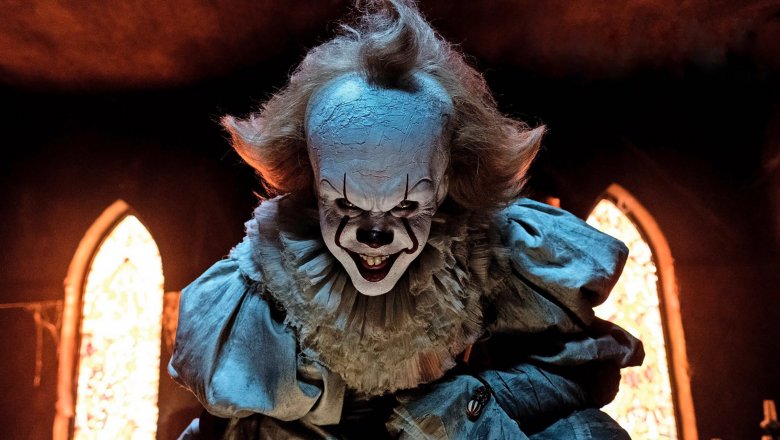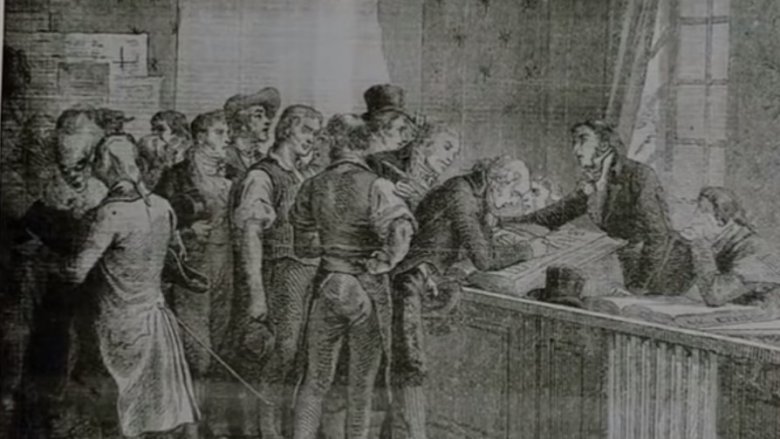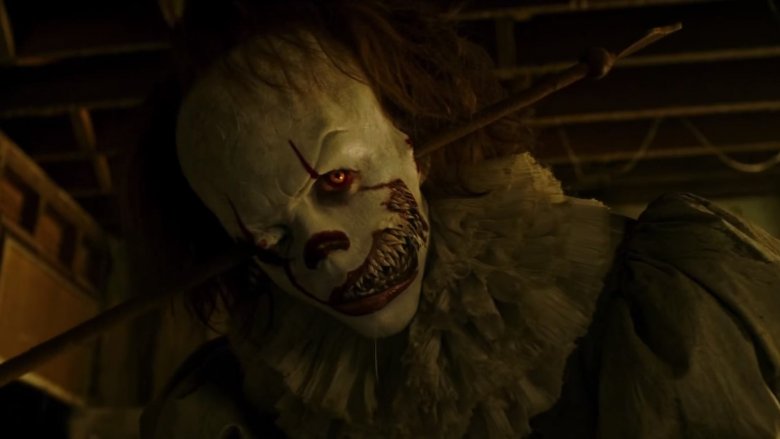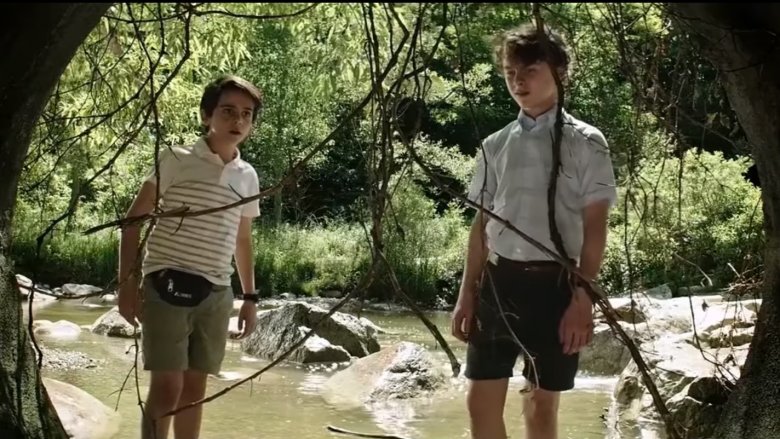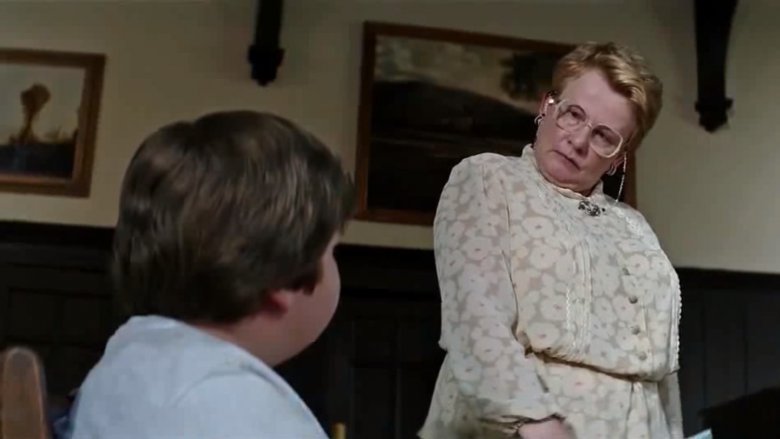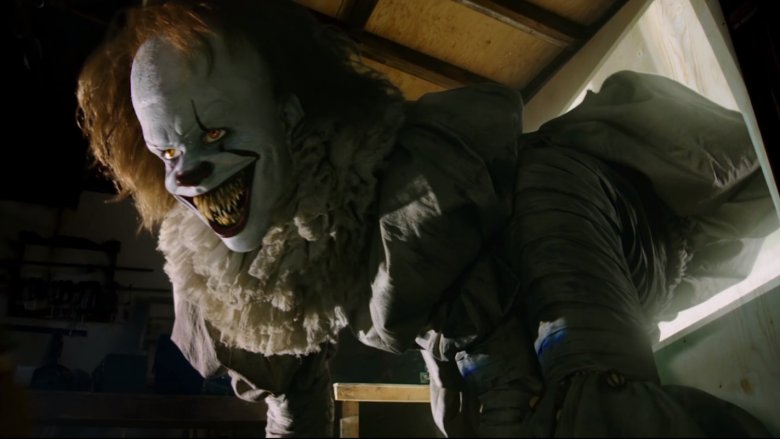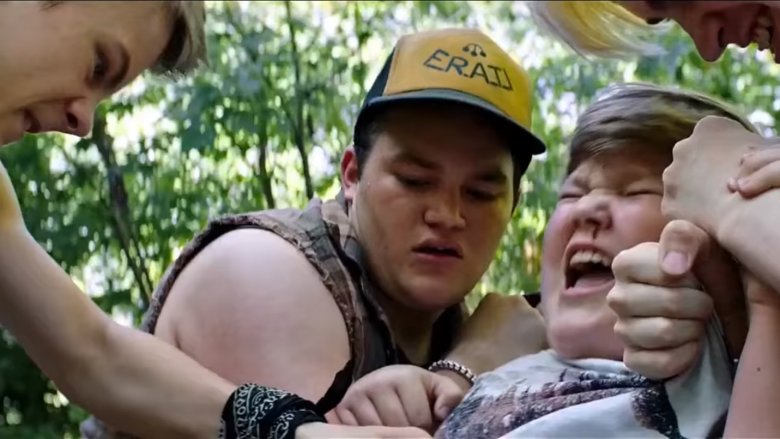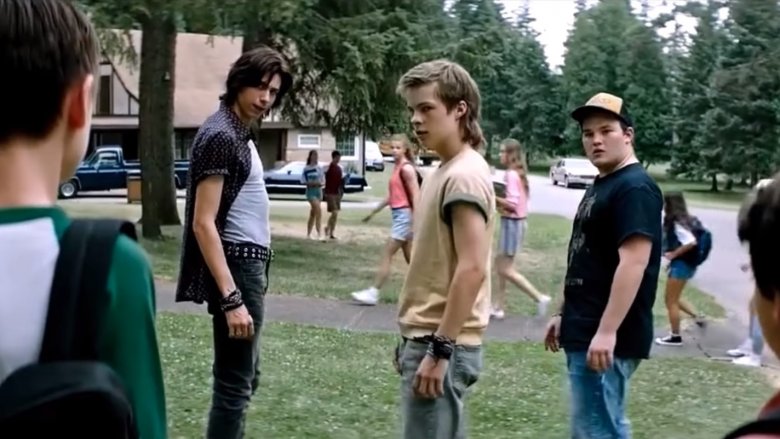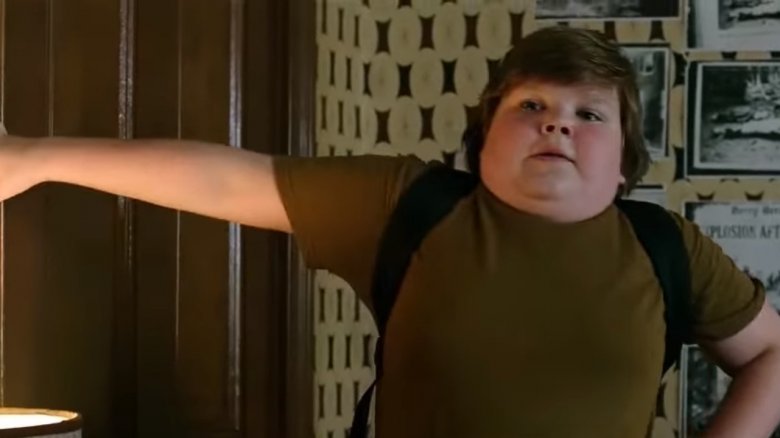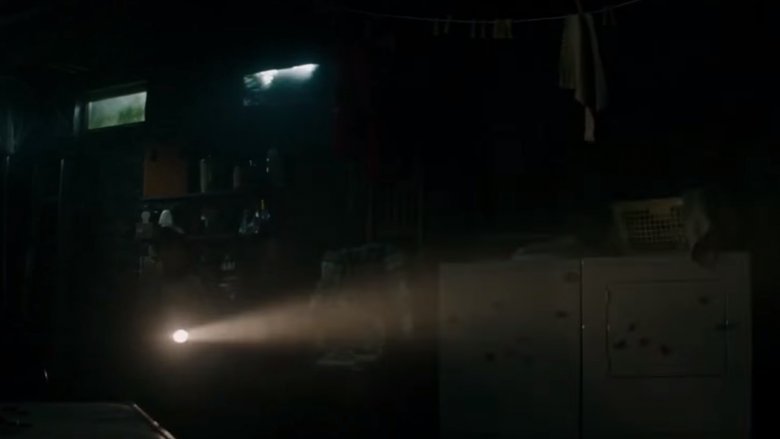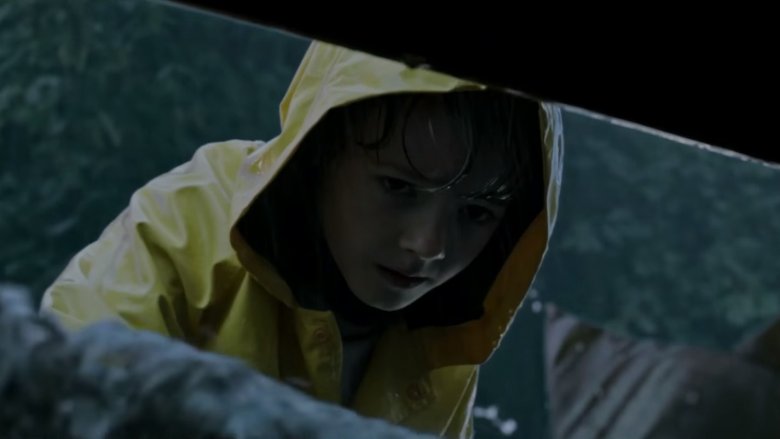Dumb Things In It Everyone Just Ignored
In 2017, fans of creepy clown hijinks rushed to the theater, breaking box office records in a rush to see It, the remake of the adaptation of the book of the same name. The movie had everything. Nostalgia value. Scares a-plenty. That stupid clown dance that probably only made the final cut because the producers knew meme-ability is synonymous with success.
Yes, It was a commercial and critical success, even achieving an elusive Certified Fresh rating on Rotten Tomatoes. The film was met with wide acclaim and hailed as a new classic, but as any fan of Doctor Who can tell you, just because something is awesome doesn't mean it can't be kind of stupid, too. Despite its iconic scenes, killer writing, and a series of knockout performances from a cast too young to remember the second Bush administration, It has its share of moments that had us scratching our heads.
Stuff you learn in history class
So the Losers Club heads back to Ben's place, right? Ben's been doing some deep research. He's got pictures and newspaper clippings lining his bedroom walls in a way that would mean red yarn connecting all the clues if this had taken place 20 years later. How he got photocopies of all of this information home when he apparently can't leave the library without getting mugged is a mystery in itself, but that isn't the point. The point is, as the lovable rapscallions peruse the pages, who shows up in an illustration? You'd better believe it's Pennywise. Yeah, baby, Pennywise the dancing clown in an engraving of the signing of Derry's charter. What a chilling turn!
Only it isn't, right?
Because It showing up in an old sketch means one of two things: Either It is doing his usual Tuesday routine, projecting into places he shouldn't be like a kill-happy, lazy-eyed party crasher, or else It was there. It was at Town Hall in the late 1700s and not only did nobody mention or object to it, but he just barely warranted making it into the 18th-century equivalent of the group photo. "All right, everybody, I'm going to start drawing now. No goofy faces. Turn toward me. Creepy bulbous-headed personification of evil, could we get you a little further to the left? Thank you! And smile!"
Who taught you murder?
As far as we know, It has one job: eatin' folk. Specifically, eatin' young folk. That's It's whole deal. It's been popping up every 27 years to do just that.
So why is he so bad at it?
Seriously. If you manage to nail down the sort of job where you only have to come into work three or four times a century, the absolute least you can do is not suck while you're there. But then along comes Pennywise with a hump-day attitude.
It's not often that you get to say this literally, but this clown is terrible at his job. How many kids does he kill? Two? Maybe four, depending how you count? The children of Derry would've been in more danger if a bad flu had hit the town. Come to think of it, more kids probably would've died if those bullies had been allowed to keep walking the life path they were already heading down. In a way, It saved more lives than he took by nipping those pieces of work in the bud. Pick a lane, Pennywise.
There's the argument that It feeds on children's fear. Two counterpoints: First, in a much more literal sense, he feeds on children. For receipts, see that scene at the beginning where he feeds on a child. Secondly, in the book, It refers to causing fear as more of a way of "salting the meat," which means this dude is risking his life to season his steak right.
There's no OSHA in coming-of-age adventures
Let's discuss, for a moment, what makes sewers so important. As with anything else we bury underground, they can be easy to take for granted. They convey human waste, rainwater runoff, and the mortal shells of our goldfish from cities to treatment plants and disposal outlets. They're more or less the key thing that separates us from animals and from peasants in the Dark Ages who died of natural causes at 23.
And these kids are traipsing through them like they're a McDonald's PlayPlace.
Every one of these kids is getting hepatitis. And rickets and scurvy and gout and diphtheria. Eddie brings this up when they first start exploring the Barrens. Hanging a lantern on an issue might protect you from snippy comments as a screenwriter, but you know what it doesn't protect you from? Cholera. This is a group of kids playing Goonies in a tunnel full of raw sewage. Some things are scarier than whacky clown monsters. Things like hemorrhagic fevers.
Librarian hubris
Ben's in the library, doing his thing. He's studying up on possible past It encounters. Gotta be ready, you know? Those who don't learn from the past are destined to repeat It. He's learning. It's good that he's in the library. We want him in the library. He's pretty much the key to this whole thing, if you think about it. There's only one person who apparently doesn't want him in the library, and that's the librarian, who appears, slamming a book on the table and tenderly jump-scaring the bejeezus out of a child. She then immediately tells Ben he shouldn't be in the library. It's summer, she says. He should be outside playing.
She kicks a quietly studious child out of the library. You know. Like librarians do.
Maybe this was just an element of the time period that's lost on those of us who weren't around back in the day, but was there really a point in history when librarians were so secure in the idea that libraries would be around forever that they'd shoo inquisitive patrons out the door? If she's still working today, that book shiller probably looks back on the days when you could evict someone from the library for something besides trying to live in the bathroom.
Maybe we're projecting
The Losers Club heads to Bill's garage, where Bill has set up what's doomed to be the second worst TED talk of all time, right after every other TED talk.
So they're flipping through slides, the electric whir-click of the projector ominously ticking down the seconds to inevitable terror. Before you can say "why didn't any of your parents send you to camp," aforementioned terror ensues. The slide projector takes on a life of its own, tossing slide after slide of Bill's family up on the screen at an ever increasing tempo, until a series of photos of Bill and Georgie's mom zoetropes a nightmarish Animorphs-style transformation. The mom turns into Pennywise! She straight up turns into Pennywise, dog! Snap, right? Cray cray.
And then nobody unplugs the projector.
Sure, five points to Gryffindor for Bev's screaming "Turn it off," and ten points for Mike's kicking it off the table, but those points are negated by the fact that NOBODY TURNS IT OFF. Everybody in the room just screams and wigs out, failing to take their lives, or in fact the power cord, into their own hands.
Kids, stop screaming and unplug the projector. And that goes double for anyone who just sat there when the chick started climbing out of TVs in The Grudge. It's hard to take your villain seriously when their kryptonite is a remote control.
Ben's got guts
Everyone loves an unkillable protagonist. X-Men has Wolverine. The Avengers have Hulk. It, apparently, has a rotund little sack of immortality named Ben Hanscom and his Indefatigable Tummy.
Ben walks off an astonishing number of gut injuries in this movie. First, the bullies try to carve their name into him with a switchblade, which he escapes by tumbling down a detritus-covered dirt hill and trouncing through sewer runoff, only to have his wounds treated by children with drug store bandages.
Then, in the creepy house, Ben gets slashed in the belly by It, which he just sort of seems to ignore afterward. After that first Haunted Mansion encounter, he's just standing out in the street with four foot-long gashes in his abdomen, 100 percent focused on the trouble his friend is in and not paying an ounce of attention to the fact that you could maybe see his appendix if you squint. You're a powerhouse, New Kid. Don't ever change.
On a side note, it's worth pointing out that during that whole scene, Eddie's mom is standing in front of Ben watching him bleed from his torso, and she thinks it's more important to slut shame a 12-year-old than it is to find him a doctor. The adults in this town are a mess.
Speaking of people who shouldn't be alive
Look, in a lot of ways, It isn't supposed to make sense. This is a piece of horror fiction that deals in absurdity and the supernatural. That said, without an anchor in reality, it becomes difficult for the audience to jibe with what's happening on screen, and there's one part of this picture that doesn't make any sense.
Specifically, how are those bullies still alive?
Seriously. Putting aside their many character faults (racism, misogyny, mullets, etc.), these children should not have survived their respective childhoods. All we see them do in this movie is take their lives into their own idiot hands for two hours. They drive blindly down alleyways at breakneck speed. They make flamethrowers out of cans of hairspray. They dive headfirst down steep hills covered in debris. They play with loaded guns.
It shouldn't have taken an extradimensional demon to beat these jerks. Every one of them should've been a full-color "In Loving Memory" page in the yearbook by their sophomore year.
Detective Ben
That Benjamin is a heck of a dude. He's got an eye for detail and an inquisitive mind. Would you believe he was the first person in all of Derry's history to notice there's an inexplicable disaster every 27 years?
No, seriously, would you believe that?
How is it that, in a town that's been around for about 250 years, the first person to notice this trend is a bored kid on summer break? Keep in mind, according to the novel, It supposedly crash-landed in this location eons ago, so this stuff has been going on for longer than there have been people. And yet nobody, not the cops or the teachers or the town historians, has ever been thumbing through A History of Derry and thought to themselves, "Huh, kids sure do get killed here on an alarmingly regular basis. How about that for a noodle scratcher?"
Congratulations, 12-year-old. You're this universe's Batman.
That basement, though
In the first scene, we're introduced to Bill and Georgie "That's Why You Don't Play in the Street" Denbrough, two boilerplate white kids living in the golden age of Spielberg-esque bicycle adventures and Atari game systems. Georgie wants to spend his afternoon messing with a paper boat because it was the '80s and nobody had invented fun yet. Bill is constructing said watercraft. He needs paraffin wax, so he sends Georgie to the cellar to grab some.
The Denbrough family basement, as it turns out, is every bit as terrifying as the hyperdimensional demon clown that we'll be introduced to later, not because of the dark or the creakiness, but because it's a big ol' mess. The place looks like the "before" picture on an episode of Animal Hoarders: Confessions if they ever found a house with a room so dirty that even the cats wouldn't go there to die.
And look, it wouldn't be a big deal if every other part of the family's life wasn't a picture of upper-middle class bliss. They own a miniature grand piano. Dad has a wood shop. This sort of lifestyle doesn't lend itself to having a deathtrap for a basement. Maybe forego one fancy-pants woodworking project and use the money you saved on lumber to hire a cleaning service for the day.
Georgie who?
If you know anyone who lost a sibling growing up, you're probably very aware that it's a devastating blow that can tear apart whole families, even communities. Parents succumb to their lesser demons. Kids become reclusive. Friendships disintegrate ... except in Derry. In Derry, you mostly shrug it off and make fun of your friends for having a fat mom.
The children of Derry have a real knack for getting over the death of one of their own, apparently. When Georgie goes missing, the only people who seem torn up about it are Bill and his dad. Probably his mom, too. Her entire contribution to the story seems to be providing incidental piano music for her youngest to get eaten by a clown to.
Everyone deals with tragedy in their own way, but aside from going on an E.T. summer adventure, none of the kids seem to do much to process the fact that a little boy straight up mysteriously Keyser Soze'd into the great unknown.
